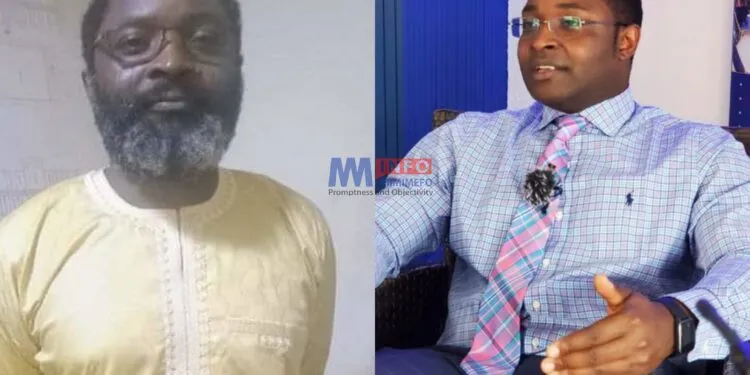The military tribunal in Yaoundé has sentenced Abdul Karim Ali, a prominent Anglophone activist and academic, to life imprisonment in absentia. The decision, rendered on April 16, 2025, by a panel of three military magistrates, has drawn sharp criticism from human rights groups and advocates of the Ambazonian independence movement, who see the ruling as emblematic of broader political repression in Cameroon.
Abdul Karim Ali, who identifies as a ‘Southern Cameroonian’, received his sentence three years following his arrest in his hometown of Bamenda, an area claimed by separatists as part of the independent state of Ambazonia. His lawyers consistently label his arrest as an ‘abduction’. They subsequently transferred him to the capital, where authorities have held him at the notorious Kondengui Central Prison after detaining him at the Secretariat of State for Defence (SED), known for its harsh treatment of political detainees.
The three-panel military magistrates handed down the sentence despite Ali, through his counsel, formally rejecting the tribunal’s jurisdiction in May 2024. In a letter to the court, Ali declared himself an Ambazonian citizen and refused to submit to what he termed the “annexationist jurisdiction of La République du Cameroun.”
“Not Ready to Surrender”: Ali’s Defiance
According to a press release issued by his lead counsel, Joseph Awah Fru, Esquire, Ali remains steadfast in his stance. “AKA was categorical, in that letter, as he fervently is now, that he is an Ambazonian and hence not ready to surrender to the annexationist jurisdiction of La République du Cameroun,” the statement read.
“Mr. Abdul Karim Ali has remained consistent in his stance—he is not Cameroonian; he is Ambazonian,” an Ambazonian activist told MMI. “Trying him as a civilian in a military court is not only a gross violation of national and international legal norms, but it also confirms the targeted and systemic oppression of those who challenge the state’s forced assimilation of Anglophone territories.”
Concerns Over Fair Trial Rights
The sentencing has raised significant concerns within the human rights and international communities. Mr. Fru’s statement highlighted the “continuous systemic and systematic violations of fundamental rights of Ambazonian Prisoners Of Conscience – APOC” by the Cameroonian state. He further emphasised the alleged breaches of international instruments guaranteeing fair trial rights for these prisoners.
“While Counsel is concerting with him and advising themselves on the way forward, the human rights community and the international community is hereby informed and put on notice on the continuous systemic and systematic violations of fundamental rights of Ambazonian Prisoners Of Conscience (APOC), especially, and the violations of all international instruments dealing with procedural and substantive inherent rights of fair trials for the APOC, by the state of Cameroun,” Mr. Fru stated.
Languishing in Prison
Though the tribunal’s ruling marks the formal conclusion of Ali’s trial, it is unlikely to end the controversy surrounding his detention. The Cameroonian government has remained largely silent on the international criticism, even as groups like Amnesty International and Human Rights Watch have documented ongoing abuses within the country’s detention centers and military tribunals. His lead counsel indicated that it is “very likely that he will be staying there.”
The Anglophone Crisis and Abdul Karim Ali
Abdul Karim Ali is a well-known figure within the context of the ongoing Anglophone crisis in Cameroon. The crisis has its roots in the historical marginalisation of the English-speaking Northwest and Southwest regions, formerly British Southern Cameroons, which unified with French-speaking East Cameroon in 1961. Over decades, grievances over political and economic marginalisation, as well as the perceived erosion of their Anglophone identity, have grown.
In recent years, these grievances have escalated into a violent conflict, with some Anglophone groups seeking independence for the region they call Ambazonia. Abdul Karim Ali has been a vocal advocate for the rights and self-determination of the Anglophone population.
His frequent appearances on international media and academic platforms have made him a symbolic figure in the struggle for Ambazonian self-determination. In 2019, he was also arrested and detained without charge, prompting international concern over Cameroon’s treatment of peaceful dissenters. His activism and outspoken criticism of the Cameroonian government’s handling of the Anglophone issue made him a target, culminating in his arrest in 2022.
His trial in a military court, as a civilian, has been a point of contention, with many arguing it violates international legal norms regarding the prosecution of civilians. The life sentence handed down in absentia is likely to further inflame tensions and draw more international scrutiny to the situation in Cameroon.
Observers say the case of Abdul Karim Ali highlights a broader pattern of military trials for civilians, particularly in Cameroon’s conflict-ridden Anglophone regions.
“The international community must not look away,” another human rights lawyer told MMI. “This sentence is not just against Abdul Karim Ali—it is against the rule of law and the right of peoples to determine their own political destiny.”



